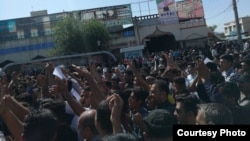Residents of a southern Iranian city have held a funeral for three people who they say were killed by security forces in a violent confrontation last week.
The residents of Kazerun shared images of Wednesday's funeral with VOA Persian. The images of large crowds at the local cemetery suggest that hundreds of people attended.
In one video clip, mourners vow to avenge the three people who residents say were killed by Iranian security forces confronting anti-government protesters late Wednesday into Thursday morning.
The chief justice of Fars province, where Kazerun is located, has said that only two people were killed in the violence. Ali al-Qasimim's assertion was reported by Iranian state media on Friday.
U.S. Secretary of State Mike Pompeo, reacting to news of the violence in Kazerun, disputed Iran's official death toll in a Friday tweet. He said there had been "3 deaths" among Iranians demonstrating against what he called Iran's "oppressive government."
It was not immediately clear why the funeral for those killed in Kazerun was held almost a week after the violence. Under Islamic tradition, bodies are buried as soon as possible after death. But Iranian authorities typically send bodies of those killed in suspicious circumstances to medical experts for examinations before releasing the bodies to family members.
Last week's violence began after hundreds of Kazerun residents marched peacefully on May 16 to protest a government plan to turn part of their municipality into a new city. The protest turned violent by nightfall, with Iranian state media saying some protesters set fire to a police station and wounded several officers in shooting and knife attacks. State media said one of those killed had been shot.
Kazerun residents have blamed security forces for the killings of three people, but the circumstances of those killings are not clear.
Many local residents have opposed the plan to divide Kazerun administratively, fearing the proposed new city would draw government funds and water resources away from their districts.
This report was produced in collaboration with VOA's Persian Service.








